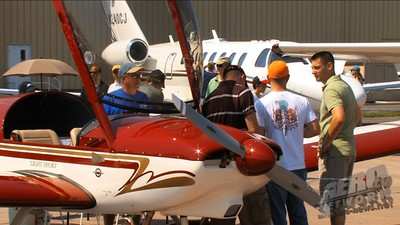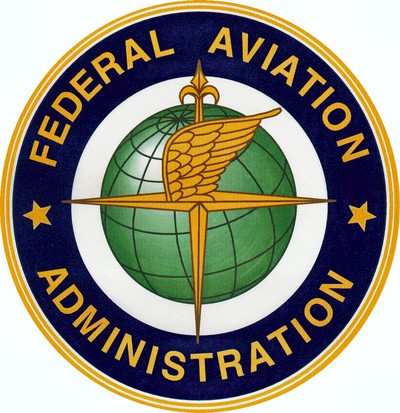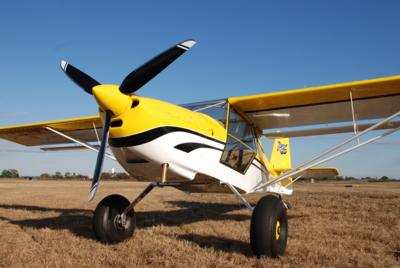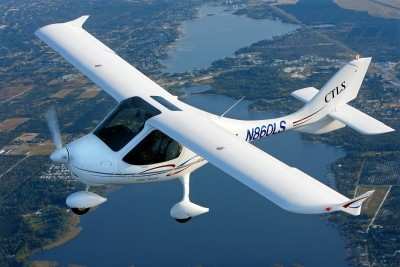Industry's 'Consensus Standards' Still Subject To Heavy-Handedness From FAA
Aero-News Analysis by Jim Campbell, ANN CEO/E-I-C
ANN has noted the hub-bub that has been started by the recent publication of an FAA 'Notice Of Policy' LONG after we raised concerns about the potential of such actions like those now being taken... While being accused of over-reacting in our stories about the FAA's actions against a few LSA manufacturers during "Audits" they conducted here in the States; we now find ourselves, again, in "I told you so" mode.

We're not happy to be in that mode at all, but what we feared then, now appears to be taking place as the FAA, who has ignored far greater dangers and problems facing other aspects of aviation, now seems to be interested in targeting a down-trodden business segment of sport aviation that (still) has the potential to create new opportunities and business for the sport and general aviation markets... and, conceivably, beyond.
The FAA submitted, "Issuance of Special Airworthiness Certificates for Light-Sport Category Aircraft" to the Federal Register late Thursday, though it only started showing up 'on the radar' as the weekend got started in earnest. With a 30 Day comment period that is scheduled to end on July 30th, 2012 -- literally as Oshkosh comes to a close, the FAA has signaled that tis hands-off policy toward the ASTM guided LSA community seems to be at an end... especially for those LSA manufacturers importing ships from outside the US. After years of horrific guidance from so-called industry leaders and associations, the poorly directed and defined LSA segment could be about to be dealt a crippling blow. Worse, the FAA, instead of taking a role in aiding the community to comply and grown with the help of the government now sees that feds engaged in a sky-cop role that can only (again) be counter-productive.
The FAA summarized this action document, stating that, "Based upon its assessment of the special light-sport aircraft (SLSA) manufacturing industry, the FAA is issuing this notice of policy to inform the public of its policy for assessing the accuracy of declarations made in Statements of Compliance issued for aircraft intended for airworthiness certification as SLSA and to ensure that SLSA conform to identified consensus standards. Additionally, in response to findings noted in its assessment of the SLSA manufacturing industry, the FAA is reiterating its policy regarding the airworthiness certification of SLSA manufactured outside the United States."
Upon analysis, the particulars concern ANN greatly, in that there exists great potential for the consensus standards program to be cast aside if the FAA deems fit.

The FAA states that, "As the number of aircraft certificated as SLSA rapidly grew, the FAA determined that it was appropriate to conduct an assessment to evaluate the health, state of systems implementation, and compliance of the SLSA industry. From September 2008 through March 2009, the Aircraft Certification Service, Production and Airworthiness Division (AIR-200) conducted an assessment of SLSA manufacturers by evaluating their systems and processes through on-site evaluation, analysis, and reporting.
The FAA assessment team collected data from SLSA manufacturers (including their extensions and distributors located in the United States) regarding compliance with applicable regulations and standards. After reviewing this data the team recommended enhancements to industry consensus standards for LSA design, manufacturing, continued airworthiness, and maintenance. It also made recommendations for changes to agency internal processes and procedures. A copy of the report can be found in the docket for this notice.
Among the report's conclusions, the FAA found that the majority of the manufacturing facilities evaluated could not fully substantiate that the aircraft for which they had issued Statements of Compliance did, in fact, meet the consensus standards identified in those documents. Therefore, the FAA could not determine that aircraft for which these statements were issued actually met the provisions of the identified consensus standards.
The assessment raised concerns that the SLSA airworthiness certification process, as originally envisioned, does not always achieve its intended purpose. Additionally, the FAA was particularly concerned that SLSA manufacturers have not been sufficiently verifying that their continued airworthiness systems are functioning properly. The FAA has determined that its original policy of reliance on manufacturers' Statements of Compliance for the issuance of airworthiness certificates for SLSA under the provisions of § 21.190 should be reconsidered and that more FAA involvement in the airworthiness certification process for SLSA is warranted."
The concept that the FAA put forward in that last sentence has ponderous implications.... the same FAA that has turned its back on safety issues time and time again, is under-staffed and poorly managed, that can't handle the current need for action on STCs and other certification chores (and is hopelessly backed up), seems to suggest that it wants and CAN exert more control over the LSA certification process... a move that can only harm a struggling market that is, at best, imperfect, but definitely trying hard to do better.

The Notice targets, in particular, LSA birds built outside the USA, explaining, "During the recent assessment, the FAA identified several anomalies involving aircraft manufactured outside the United States. These included:
- Aircraft manufactured outside the United States that were shipped disassembled to the United States, and assembled by U.S. persons who declared themselves to be the U.S. manufacturers. The FAA found that some aircraft were manufactured in countries with a bilateral agreement and some were not. In both situations, the U.S persons who performed the assembly did not, or could not, carry out the functions to which they attested in their Statements of Compliance for the aircraft.
- Aircraft manufactured in countries without bilateral agreements that were “passed through” a country with which the U.S. has a bilateral agreement. A person in the country with which the U.S. has a bilateral agreement completed the Statement of Compliance before shipping the aircraft to the United States. Again, these persons did not, or could not, carry out the functions to which they attested in their Statements of Compliance for the aircraft.
- Aircraft for which a foreign entity claimed responsibility for certain aspects of the Statement of Compliance and a U.S. person claimed responsibility for the remaining aspects, thereby splitting the manufacturer's responsibility between two distinct persons; and
-
Aircraft manufactured in countries with appropriate bilateral agreements by entities that would ship the aircraft to a U.S. distributor. Neither the U.S. distributor nor the foreign entity could maintain a program to correct safety-of-flight issues as attested to in the aircraft's Statement of Compliance.

"The assessment clearly identified that aircraft have been supplied to U.S. persons who lack the ability to reasonably attest to the provisions set forth in § 21.190(c). Additionally, U.S. persons have been providing the FAA with a manufacturer's Statement of Compliance identifying themselves as the U.S. manufacturer of an aircraft when the aircraft was in fact produced outside the United States. These situations are not in compliance with the regulations. The FAA did not intend for U.S. persons to receive disassembled LSA from outside the United States, reassemble them within the United States, and characterize themselves as the U.S. manufacturer of an SLSA. As these persons cannot substantiate the information contained in the Statement of Compliance, the FAA does not consider them to be the manufacturers of the aircraft. Accordingly, the FAA will not issue airworthiness certificates in the light-sport category for these aircraft.
Additionally, persons who are unable to make available the documents required by the consensus standards and regulations, do not have the systems in place to monitor and correct safety-of-flight issues, or are unable to adequately ensure the continued airworthiness of the aircraft they assemble, would not be able to sign a Statement of Compliance as a manufacturer. The FAA also notes that any person who makes any fraudulent, intentionally false, or misleading statement on the Statement of Compliance could be found to be in violation of 14 CFR 21.2."
The FAA is not unaware that the effect of this doc may be severe... but that fact does not seem to have resulted in a doc that seeks solutions other than having the FAA crack down, in their own way, on this market segment.

"The FAA recognizes that upon implementation of this policy, some entities who have claimed to be SLSA manufacturers may not be able to issue a valid Statement of Compliance, and that other entities may not be willing to assume responsibility for continuing operational safety requirements. Therefore, aircraft within the existing fleets from these manufacturers may no longer be eligible to retain their airworthiness certification as SLSA. These aircraft, however, may be eligible for airworthiness certification as experimental light-sport aircraft (ELSA). The FAA does not intend to accept continued operational safety responsibility for an SLSA whose manufacturer no longer exists or is unable or unwilling to assume that responsibility. The FAA also recognizes that some aircraft that are primarily manufactured outside the United States and assembled in the United States may be found to be ineligible for airworthiness certification as SLSA or ELSA."
The aviation community has 30 days to comment (28 as of today--see link below) and the topic is expected to be a hot one at Airventure... where the inadequate and conflicted guidance and support given to the LSA movement by EAA, AOPA, LAMA and other entities is likely to create more than a little finger-pointing and a VERY LIVELY discussion at the Annual "Meet The Boss" gathering during the Fly-In.
As always, we'll keep you informed...
 ANN's Daily Aero-Linx (04.16.24)
ANN's Daily Aero-Linx (04.16.24) Aero-News: Quote of the Day (04.16.24)
Aero-News: Quote of the Day (04.16.24) Airborne 04.10.24: SnF24!, A50 Heritage Reveal, HeliCycle!, Montaer MC-01
Airborne 04.10.24: SnF24!, A50 Heritage Reveal, HeliCycle!, Montaer MC-01 Airborne 04.12.24: SnF24!, G100UL Is Here, Holy Micro, Plane Tags
Airborne 04.12.24: SnF24!, G100UL Is Here, Holy Micro, Plane Tags Airborne-Flight Training 04.17.24: Feds Need Controllers, Spirit Delay, Redbird
Airborne-Flight Training 04.17.24: Feds Need Controllers, Spirit Delay, Redbird







